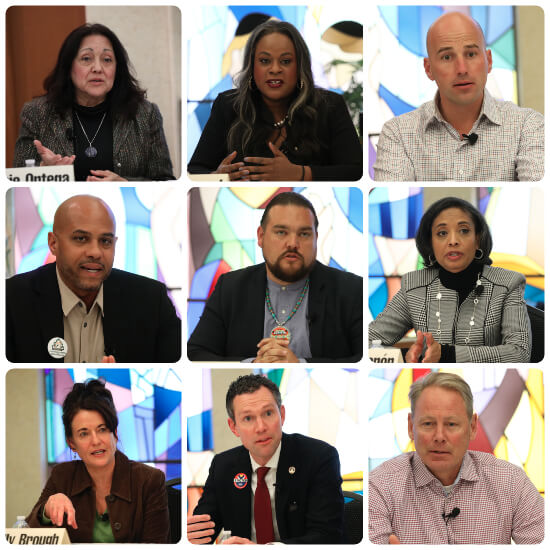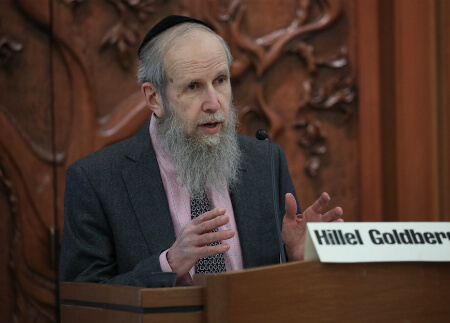Photos: Aleksei Kolesnikov
The expansive, unprecedented field of candidates vying to become Denver’s next mayor is a familiar group; not necessarily to voters, but certainly to each other.

Top, l-r: Debbie Ortega, Leslie Herod, Andy Rougeot
Middle, l-r: Terrance Roberts, Ean Tafoya, Lisa Calderón
Bottom, l-r: Kelly Brough, Chris Hansen, Thomas Wolf
“We’ve been on stage so many times, 40 forums or so by now,” said candidate Leslie Herod.
Those next to her nodded knowingly.
To date, there has been little separation among these candidates in term of polling. No front runners have emerged from the pack.
The latest candidate forum, the March 16 Mayoral Forum, sponsored by the Intermountain Jewish News, marked the 40th anniversary of the IJN-sponsored Denver mayoral forum.
Candidates addressed familiar issues — homeless encampments and crime, and also revealed a few relatively untapped topics, including the presence of anti-Semitism in Denver.
Nine candidates spoke before an estimated crowd of 150 at BMH-BJ. Candidate Mike Johnston was scheduled to participate but cancelled on the day of the debate due to COVID.
IJN assistant editor Chris Leppek, and KOA radio’s Susan Witkin posed questions to the nine candidates. Rabbi Hillel Goldberg moderated, keeping the peace and civility of the debate.
Rabbi Goldberg opened the forum by asking four “yes or no” questions to each candidate.
Then the panelists posed questions that a candidate was given one minute to answer.
Each candidate was given 90 seconds for a closing statement.
Anti-Semitism
Leppek queried five of the mayoral hopefuls: “How serious is the problem of anti-Semitism in the Denver area today?”
“The horrible murder we had of a young man walking back from Yeshiva last summer, I think speaks to how much anti-Semitism is found in our city,” said Andy Rougeot, whose wife is Jewish, along with their two Jewish daughters. “I know the police said that wasn’t a hate crime. I don’t believe them.
“It’s important that we increase funding for our police to keep our city safer,” added Rougeot, a former US Army officer and a small business owner. “The community that’s going to feel the most historically (threatened) has been the Jewish community. The canary in the coal mine for violence is the Jewish community.”
“Our Jewish population makes up 2% of the country and 2% of Colorado,” said City Councilwoman Debbie Ortega. “It is unfortunate that we still have anti-Semitism happening across this country.
“We should all be standing up in opposition to hate crimes of any kind, including anti-Semitism. We have seen black churches bombed across the country. We have seen synagogues target targeted. Recently we had the incident with DU.
“I will engage the faith community by reviving the faith leadership group that was started under Mayor Hickenlooper when we had the Denver Road Home Program in place.”
“I remember when Alan Berg was machine gunned down (1984) in the city of Denver by a white supremacist group pool,” said Terrance Roberts, subject of the book The Holly, by Julian Rubenstein. “I think anti-Semitism is high all over the world.”
Ean Tafoya offered his take:
“White supremacy is on the rise,” said Tafoya, an environmental activist and state director of Green Latinos.
“Whether you come from indigenous communities, Latino communities, hate groups have been on the rise. In the black community, certainly George Floyd protests showed us the white supremacists had no problems showing their face coming forward and starting problems not just in Denver, but all across the United States.
“We have to be responsive and listening to communities. Recently we talked about actually about a Jewish heritage district in District One on the other side of town. The community came together and said they didn’t want it. Let’s find other ways to celebrate our cultures and work together.”
Thomas Wolf, who ran for mayor in 2011 and is managing director of the investment firm, Crewe Capital, recounted an anti-Semitic occurrence when attending the 2013 funeral of Robert Mintz.
“It was going to be protested, if you remember that,” said Wolf. “They put a ring around it by some crazy religious group. I lose the term, but they were just protesting. It was kind of a big confrontation.”
Faith Based
Leppek also quizzed candidates: “Do you think that faith-based organizations, including those associated with the Jewish community, have a role to play in the challenges that Denver is facing today?”

Rabbi Hillel Goldberg, moderator
“Yes, it’s going to take not only faith-based community groups, I believe we’re going to need the public-private, and non-profit sectors all working together on some of the challenges we face,” said Kelly Brough, who was chief of staff to former Mayor John Hickenlooper and until recently was CEO of the Denver Metro Chamber of Commerce.
“Frankly, it’s the faith-based community who can inform so many others and who we’re going to need in these spaces to help us address the work we have to do, particularly around people experiencing homelessness.”
“The answer is absolutely yes,” said Chris Hansen, currently in his second term as a state senator.
“Faith groups play a hugely vital role in the city and county of Denver.
“We’ve made huge success in the legislative work I’ve done on behalf of this district, working on things like protecting the safety and security of houses of worship.”
Police
A familiar theme along the campaign trail has been the relationship between the Denver Police Department and citizens.
“We are two years past George Floyd and we actually have more police killings now than before his murder,” said Lisa Calderón, professor at Regis University and executive director of a nonprofit that counsels women running for political office.
“So there has been a lot of harm that needs to be repaired, particularly with the black community. I also know that when people do not feel safe, that is their reality.
“We need to talk with communities about what does community safety mean?” said Calderon, who ran for mayor in 2019.
“It’s community efficacy, the kinds of solutions that we can create together.”
“We know the relationship between law enforcement and community right now is strained,” said State Rep. Herod.
“In fact, less people growing up today want to be law enforcement officers than they did back in the day. We have to change that.
“We have to make sure we have a police force that is accountable, that is the best trained force in the nation.”
“The safety department is the biggest portion of our budget. I would say that they’re paralyzed,” said Wolf.
“One example would be car theft. We lead the country in car theft. Just the magnitude of that is 40,000 cars were stolen in Colorado last year. 14,000 in city and county of Denver. That’s 20 per cop.”
“OK, so you wonder there’s a cause and effect there.”
Roberts added his concern about crime in the city.
“We had 88 homicides in Denver last year. We had 96 homicides in 2021 and we had 95 homicides, 2020.
“We had over three dozen women murdered in the metro area last year, women who were Denver Latinas or African-American women. No one’s saying anything about this.
“As we’ve learned, if poverty rises, guess what else rises? White supremacy. The first victims of white supremacy, the Jewish community, gets blamed. The African-American community gets blamed. The Latino community gets blamed.”
Hansen added: “One thing we missed in the state legislature was gun violence prevention. My boys are in high school, and they are scared. The students at East High School are scared. We have to do better.”
Another hot-button item: zoning. “Even though we’re in a housing crunch,” said Roberts, “there are 78 different neighborhoods, so I don’t think a blanket zoning change for a growing city with over 700,000 people is the right approach.”
Polls
In an unscientific exit poll of those attending the IJN forum, Brough led the field at 21%, followed by Rougeot and Hansen at 14% each and Tafoya at 12%.
The other candidates were in single digits: Herod and Ortega at 8%, Calderón and Johnston with 7%, and Wolf with 2%.

Panelists Chris Leppek (IJN) and Susan Witkin (KOA)
According to latest polling by Survey USA, Brough, Calderón and Johnson are tied atop the mayoral field with 5% of voters. Hansen and Ortega are at 4%. Herod, Wolf and Al Gardner are at 3%, and Rougeot, Roberts and Trinidad Rodriguez at 2%.
Perhaps more telling than polling is the amount of campaign financing, and in that respect Johnston and Brough have distanced themselves from the field.
According to SearchLight Denver, the office of the Denver clerk and recorder, Johnston’s campaign has received $2,211,843, while Brough has brought in $2,079,740. Herod is third on the list with $941,477 and Rougeot with $806,215. Ortega is next-closest at $469,748.
The mayoral field was whittled from 17 to 16 on the day of the IJN Mayoral Forum, as Kwame Spearman pulled out of the race while pledging his support to Kelly Brough.
Even at 16 candidates, Denverites — and political onlookers nationwide — wonder out loud, “Why is the field so large?”
“First of all, it’s an open seat,” said Ortega. “That means the mayor can’t run again. So every time that happens, you have a lot of interest in the seat.”
“With what has happened with this race,” said Herod, “is that Denver residents are feeling like there’s a lack of leadership in this city.”
“I think we actually mostly agree on what the problems are,” said Rougeot. “We have vast differences on what the solutions are.”
Hansen appeared aghast with the volume of candidates in the race.
“One of the biggest factors is that ballot access is too easy,” said Hansen. “We had to turn in an affidavit and 300 verified signatures. If you compare that to running for statehouse or running for state senate, you need a thousand validated signatures.
“I think we need some reform here. It needs to be at least 1,500, which is what we use for congressional races. And then you don’t get the funds until you are on the ballots.”
Roberts had perhaps the most accurate conclusion:
“This is kind of a wacky race, right?”
Keep your scorecards handy. After election day, April 4, the candidates with the top two voting tallies will head to a runoff election on June 6.
Copyright © 2023 by the Intermountain Jewish News
















